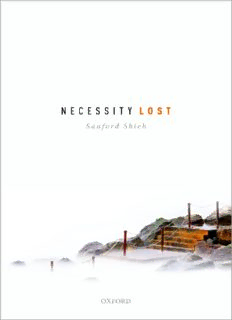Table Of Content(cid:105) (cid:105)
“Necessity-Lost” — 2019/2/27 — 13:29 — page i — #1
(cid:105) (cid:105)
Necessity Lost
(cid:105) (cid:105)
(cid:105) (cid:105)
(cid:105) (cid:105)
“Necessity-Lost” — 2019/2/27 — 13:29 — page ii — #2
(cid:105) (cid:105)
(cid:105) (cid:105)
(cid:105) (cid:105)
(cid:105) (cid:105)
“Necessity-Lost” — 2019/2/27 — 13:29 — page iii — #3
(cid:105) (cid:105)
Necessity Lost
Modality and Logic in Early Analytic
Philosophy
Volume I
Sanford Shieh
3
(cid:105) (cid:105)
(cid:105) (cid:105)
(cid:105) (cid:105)
“Necessity-Lost” — 2019/2/27 — 13:29 — page iv — #4
(cid:105) (cid:105)
3
GreatClarendonStreet,Oxford,OX26DP,
UnitedKingdom
OxfordUniversityPressisadepartmentoftheUniversityofOxford.
ItfurtherstheUniversity’sobjectiveofexcellenceinresearch,scholarship,
andeducationbypublishingworldwide.Oxfordisaregisteredtrademarkof
OxfordUniversityPressintheUKandincertainothercountries
©SanfordShieh2019
Themoralrightsoftheauthorhavebeenasserted
FirstEditionpublishedin2019
Impression:1
Allrightsreserved.Nopartofthispublicationmaybereproduced,storedin
aretrievalsystem,ortransmitted,inanyformorbyanymeans,withoutthe
priorpermissioninwritingofOxfordUniversityPress,orasexpresslypermitted
bylaw,bylicenceorundertermsagreedwiththeappropriatereprographics
rightsorganization.Enquiriesconcerningreproductionoutsidethescopeofthe
aboveshouldbesenttotheRightsDepartment,OxfordUniversityPress,atthe
addressabove
Youmustnotcirculatethisworkinanyotherform
andyoumustimposethissameconditiononanyacquirer
PublishedintheUnitedStatesofAmericabyOxfordUniversityPress
198MadisonAvenue,NewYork,NY10016,UnitedStatesofAmerica
BritishLibraryCataloguinginPublicationData
Dataavailable
LibraryofCongressControlNumber:2018962715
ISBN978–0–19–922864–5
TypesetbySanfordShieh
PrintedandboundinGreatBritainby
ClaysLtd,ElcografS.p.A.
LinkstothirdpartywebsitesareprovidedbyOxfordingoodfaithand
forinformationonly.Oxforddisclaimsanyresponsibilityforthematerials
containedinanythirdpartywebsitereferencedinthiswork.
(cid:105) (cid:105)
(cid:105) (cid:105)
(cid:105) (cid:105)
“Necessity-Lost” — 2019/2/27 — 13:29 — page v — #5
(cid:105) (cid:105)
For Mihaela
(cid:105) (cid:105)
(cid:105) (cid:105)
(cid:105) (cid:105)
“Necessity-Lost” — 2019/2/27 — 13:29 — page vi — #6
(cid:105) (cid:105)
(cid:105) (cid:105)
(cid:105) (cid:105)
(cid:105) (cid:105)
“Necessity-Lost” — 2019/2/27 — 13:29 — page vii — #7
(cid:105) (cid:105)
Contents
Preface xiii
Abbreviations xxi
Introduction 1
NecessityLost: Frege 2
NecessityLost: Russell 6
LookingAhead: NecessityRegained 10
ClosingRemarks 12
Part I. Frege
1. The Modalities of Judgment 17
1.1 FregeagainstTraditionalLogic 18
1.1.1 ABriefSketchofTraditionalLogic 18
1.1.2 KantonJudgmentandLogic 20
1.1.3 ProblemsofTraditionalLogic 27
1.1.4 TheFregeanSolution 29
1.2 Frege’sEarlyConceptionofJudgment 33
1.3 FregeagainstKantinBegriffsschrift 39
1.4 ModalityinFrege’sBegriffsschrift 49
2. Amodalism 57
2.1 TwoInterpretationsofFregeonModality 58
2.2 TruthisAbsolute 61
2.2.1 AgainstHilbertandKorselt 62
2.2.2 ThoughtsarenotTemporalorSpatial 66
2.3 Amodalism 68
2.4 EarlyTruthAbsolutismandAmodalism 71
2.5 InadequateGroundsforAmodalism 73
3. From Judgment to Amodalism 77
3.1 JudgmentandTruthaftertheSense/ReferenceDistinction 79
3.2 RedundancyagainstthePredicationAnalysis 83
3.2.1 MoreVarietiesofRedundancy 87
3.2.2 DoubtsaboutRedundancy 88
3.2.3 Summary 89
(cid:105) (cid:105)
(cid:105) (cid:105)
(cid:105) (cid:105)
“Necessity-Lost” — 2019/2/27 — 13:29 — page viii — #8
(cid:105) (cid:105)
viii contents
3.3 TheIndefinabilityofTruth 89
3.4 WhatisaSteptoaTruth-Value? 96
3.5 TheRecognitionalConceptionofJudgment 99
3.5.1 TheSupervenienceofTruth-PredicatingJudgments 100
3.5.2 JudgmentasRecognition 102
3.5.3 RecognitionasSteptotheLevelofReferents 102
3.5.4 Thoughts(Gedanken)asRepresentations
(Vorstellungen) 103
3.5.5 TheConstitutionoftheSteptoaTruth-Value 108
3.5.6 TheRecognitionalConceptionandRedundancy 111
3.5.7 NugatioabOmniaNævoVindicatus 113
3.5.8 TwoWorries 115
3.5.9 TheRecognitionalConceptionandObject-Relation
Interpretations 119
3.5.10 RecognitionandAcknowledgment 120
3.6 Judgment,Judging,andFactivity 124
3.6.1 AgainsttheFactivityofFregeanJudgment 124
3.6.2 FortheFactivityofFregeanJudgment 126
3.6.3 Judgingvs. Judgment;HoldingTruevs.
AcknowledgmentofTruth 127
3.6.4 TheIndependenceofTruthfrom
AcknowledgmentofTruth 130
3.6.5 ALettertoJourdain 131
3.7 ApparentThoughts 133
3.8 TheBasicArgumentforTruthAbsolutism 136
3.9 TheBasicArgumentbeforetheSense/Reference
Distinction? 140
3.10 AConcludingRemark 143
4. The Truth in Modalism 145
4.1 PartsofThoughts 146
4.1.1 BetweenBegriffsschrift andtheSense/Reference
Distinction 147
4.1.2 AftertheSense/ReferenceDistinction 153
4.1.3 MultipleAnalyses 154
4.2 FregeanAccountsofTemporalism 156
4.2.1 SensesexpressedasaFunctionofTime 157
4.2.2 AnotherArgumentagainstTemporalism 158
4.2.3 SensespresentingTimesasPartsofThoughts 167
4.2.4 TemporalModalDiscourse 169
4.3 FregeanAccountsofCircumstantialism 170
4.3.1 AParalleltoTemporalism 170
(cid:105) (cid:105)
(cid:105) (cid:105)
(cid:105) (cid:105)
“Necessity-Lost” — 2019/2/27 — 13:29 — page ix — #9
(cid:105) (cid:105)
contents ix
4.3.2 CircumstancesasThoughts,I 173
4.3.3 MetaphysicalModalDiscourse,I 175
4.3.4 CircumstancesasThoughts,II 176
4.3.5 MetaphysicalModalDiscourse,II 182
4.3.6 ConcludingRemark 184
4.4 Analyticity,Apriority,andModality 185
5. The Nature of Logic 192
5.1 Frege’sMainCharacterizationsofLogic 193
5.1.1 UniversalityorGenerality(Allgemeinheit) 193
5.1.2 LogicalLawsareTruths 195
5.1.3 TheJustificationofLogicalLaws 197
5.1.4 PrimitiveandDependentTruths 200
5.1.5 LogicalandotherSourcesofKnowledge 201
5.1.6 PrimitiveTruths,AxiomsandJustificational
Independence 203
5.1.7 Self-EvidenceandSelf-Sufficiency 205
5.2 TheConstitutionofJustificationalSelf-Sufficiency 210
5.2.1 SemanticsandSoundnessArguments 213
5.2.2 SoundnessArgumentsasLogicalityArguments 219
5.2.3 IsFregegivingLogicalityArguments? 221
5.2.4 AProblemforLogicalityArguments 226
5.2.5 AnAlternativetotheLogicalityInterpretation? 229
Part II. Russell and Moore
6. From Idealism to Logicism 233
6.1 Bradley’sTheoryofModality 234
6.1.1 HypotheticalJudgments 234
6.1.2 JudgmentsofNecessityandPossibility 238
6.2 Geometry,Logic,andNecessity 241
6.2.1 KantonGeometryandtheProblemof
Non-EuclideanGeometries 241
6.2.2 DifferenceswithKant: Syntheticity,Apriority,and
Necessity 244
6.2.3 TheTranscendentalJustificationofProjective
Geometry 246
6.3 TheUltimateIndemonstrabilityofNecessity 249
6.4 NecessityandLogicism 254
6.4.1 MainFeaturesofAxioms 254
6.4.2 TheLogicalCalculusandAnalysisofManifolds 257
(cid:105) (cid:105)
(cid:105) (cid:105)
Description:A long tradition, going back to Aristotle, conceives of logic in terms of necessity and possibility: a deductive argument is correct if it is not possible for the conclusion to be false when the premises are true. A relatively unknown feature of the analytic tradition in philosophy is that, at its v

